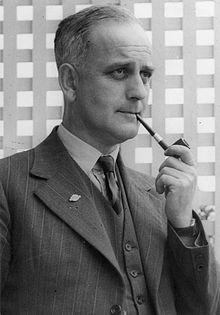Ralph Hanan
Josiah Ralph Hanan (born June 13, 1909 in Invercargill , Southland region , South Island , New Zealand ; † July 24, 1969 in Cairns , Queensland , Australia ) was a politician of the New Zealand National Party who was a member of the House of Representatives between 1946 and 1969 and several times Was minister of various departments.
Life
Lawyer, Mayor and World War II
Hanan was the youngest of five children of the businessman James Albert Hanan and his wife Johanna Mary McGill, and the nephew of Josiah Hanan , who was a representative of the Liberal Party in the House of Representatives between 1899 and 1925 and was at times Minister of Justice and Education. After attending Southland Boys 'High School and Waitaki Boys' High School in Oamaru, he himself began studying law at the University of Otago . After completing his studies, he returned to Invercargill and took up a position as a lawyer . He began his political career in local politics when he was elected a member of the Invercargill City Council in 1935. In 1938 he was elected mayor of Invercargill and founded the law firm Hanan Arthur and Company there in 1939 with his friend Ian Arthur .
At the beginning of the Second World War , Hanan volunteered for military service in January 1940 and resigned from his mayor's office in 1941. In the following years he participated as a member of the 20th Canterbury-Otago Battalion in combat missions in the Middle East and Italy . He was last promoted to captain and wounded three times in combat operations, most recently almost fatally. After the end of the war, he returned to Invercargill and resumed legal practice with Ian Arthur.
MP and Minister
In the elections on 26./27. November 1946, Hanan was elected to the House of Representatives for the first time as a candidate of the New Zealand National Party in the constituency of Invercargill and was initially backbencher during the opposition years until 1949, but also in the first years of the National Party in government between 1949 and 1954.
On November 26, 1954 Hanan was of Prime Minister Sidney Holland appointed Minister of Health and Immigration (Minister of Health and Immigration) in the second Cabinet appointed. He held this ministerial office between September 20 and December 12, 1957 in the first cabinet of Prime Minister Keith Holyoake that followed .
After the victory of the National Party in the election on 26 November 1960, he was Prime Minister Holyoake on 12 December 1960. Attorney General and Minister of Justice (Attorney General and Minister of Justice) and to the Minister of Māori Affairs ( Minister of Māori Affairs ) in appointed his second cabinet . He held these ministerial offices in the third Holyoake cabinet until his death on July 13, 1969. At the same time he served in the third Holyoake cabinet between December 20, 1963 and his death as Minister of Island Territories .
As Attorney General, he carried out a number of significant legislative reforms with significant support from Justice Department Secretary John Lochiel Robson . In 1961 the Crimes Act 1961 was passed. Although an opponent of the death penalty itself, this criminal law provided for the death penalty for three offenses ( treason , murder and manslaughter ). During his tenure, the Parliamentary Commissioner (Ombudsman) Act 1962 was passed , which for the first time in the English-speaking world, based on the Scandinavian model, introduced the office of ombudsman . In 1965 the Law Revision Commission was established to review laws and draft possible legislative and legal reforms, which in 1985 led to the establishment of a permanent legal commission (Law Commission) . Other significant legislative acts of his tenure included the Criminal Justice Amendment Act 1962 , the Sale of Liquor Act 1962 , the Criminal Injuries Compensation Act 1963 , the Matrimonial Proceedings Act 1963, and the Status of Act Children (Status of Children Act 1969) .
During his tenure as Minister for Māori Affairs, the Maori Education Foundation 1961 and the Maori Affairs Amendment Act 1967 were passed , which gave the ministry the authority to restructure land and property rights of the Māori , which was not generally accepted by the Māori found. As Minister for Island Territories, he laid the foundations for the self-government of the Cook Islands . As a member of parliament, Hanan advocated the construction of the Manapouri power plant , the largest underground power plant in the country on Lake Manapouri , which is controversial among the population .
His marriage to Ruby Eirene Anderson on March 3, 1939 at St Paul's Presbyterian Church in Invercargill had a son and a daughter.
Web links
- Biography in Te Ara - The Encyclopedia of New Zealand
Individual evidence
| personal data | |
|---|---|
| SURNAME | Hanan, Ralph |
| ALTERNATIVE NAMES | Hanan, Josiah Ralph (full name) |
| BRIEF DESCRIPTION | New Zealand politician |
| DATE OF BIRTH | June 13, 1909 |
| PLACE OF BIRTH | Invercargill , Southland Region , South Island , New Zealand |
| DATE OF DEATH | July 24, 1969 |
| Place of death | Cairns , Queensland , Australia |
